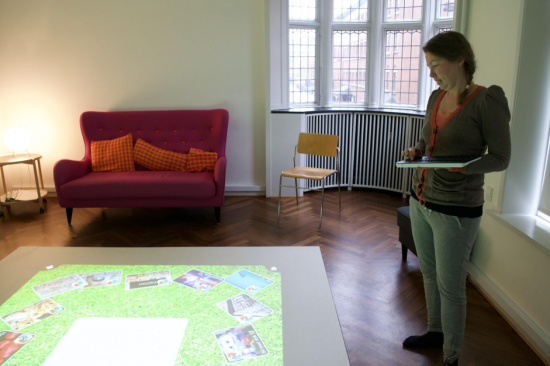Case: Elderly care / Dementia centres
WizeFloor Helps People Suffering From Dementia With Strategies in Everyday Life
It is common for people with dementia to wander or become lost or confused about their location. WizeFloor can be a tool to help people with dementia learn strategies for how to handle chaotic or confusing situations. In the heart of Aarhus you will find DemensCentrum, which is a centre for dementia sufferers and their relatives. At the centre there is a room only for WizeFloor, and the interactive floor is being used daily.
WizeFloor is popular because the floor is used in a meaningful manner, which the users can relate to experiences from their everyday lives.

According to the ergotherapist at the training and rehabilitation unit in DemensCentrum, Anne Maj Bonde Schmidt, and dementia consultant Anders Kristian Andersen, the WizeFloor room is very successful.
Since 2014, when it was established, DemensCentrum has had a WizeFloor. Here the citizens practice in teams that are formed according to level and diagnosis. WizeFloor is a tool for learning without the citizens necessarily need to be in the real world. In particular, WizeFloor is ideal for training strategies. For a dementia sufferer it is important to have strategies that he or she can use in their everyday lives. For example, it could be a new route that the person must learn to know. Here one of the learning techniques for the citizen is to create a point of reference.
WizeFloor is suitable for training different cognitive functions and for learning some strategies through the various activities, which can relate to everyday life.
When a citizen solves a puzzle on the WizeFloor, Anne May Bonde Schmidt and Anders Kristian Andersen help the citizens form a point of orientation in the jigsaw puzzle. This could for example be an animal in the image where the citizen must notice where the animal is located in the picture. Is it to the left or to the right? Or is it at the top or bottom of the picture? The citizens do not need to have an overview of the whole jigsaw puzzle. When the citizens get a point of orientation, they feel secure about something in the image.
The citizen can use such points of orientation in their everyday lives when using a new city route for example. Here the citizen can make some points of orientation along the new route. f the person has to walk from the central station in Aarhus to Magasin (large shopping centre), a point of orientation could be Salling (another shopping centre on the way between the central station and Magasin). DemensCentrum uses WizeFloor to provide the citizens with strategies that they can use in their everyday lives.
Helps people overcome challenges
WizeFloor is also used to teach people how to tackle the problems that may arise when you suffer from dementia. Sometimes Anne May asks the citizens to step away from the floor so they can get an overview of the game and take a deep breath.
When they experience difficulties in their daily lives and things become difficult or tricky, they just need to stop, take a deep breath and try again. It is an important strategy for people with cognitive difficulties. Because things will go wrong. They will stop and be unable to remember what they were about to do. However, if they have learned to step away from the floor, count to three and take a breath, they will be able to remember what they forgot or they will calm down. The aim is to teach them not to get upset, sad or angry when things fail, because things will fail and become more difficult when you have got dementia,
WizeFloor is ideal for teaching strategies and supporting citizens in how to solve the problems they encounter in their daily lives. In fact, WizeFloor can be used to deal with most of the difficulties that people with dementia meet, and to train strategies based on these, says Anders Kristian Andersen.
WizeFloor can be used to train memory and recognisability
Through the various games offered by WizeFloor, citizens can train planning, memory, concentration, responsiveness, orientation, their language and social skills. The staff can adjust the level of difficulty of the games to suit the different levels of the citizens. In addition, the employees can create games or use and customize the games on the WizeFloor app.
DemensCentrum also uses WizeFloor to bring the citizens’ surroundings into play. It can be a picture from a walk, a holiday or a Christmas meal which is made into a puzzle. Training is often based on the citizens’ interests.
We make quizzes in all varieties. If a person is interested in rock music, we make a rock music quiz. Many of the citizens find quizzes about general knowledge exciting. Long-term memory has been preserved in the early stages of a dementia disease, and it is a success experience when they are good at general knowledge.
With the WizeFloor, they can also train language and words by means of spelling games, where letters must be combined to form words. Here the letters are placed in alphabetical order on the floor.
The task is that the citizens have to work in groups and do it by turns. Another task is that one of them must step forward. he citizens must work together and ask each other when they need help but also be quiet when the others are solving a task on the floor,” Anne Maj Bonde Schmidt says.
It is useful practice for the citizens to cooperate in groups and afterwards evaluate how it was to cooperate.
Maintenance and coping strategies
Every six months, DemensCentrum tests their citizens with a MoCA test, which shows how resourceful the citizen is and which limitations the citizen has. The task is to find out how the citizen’s resources can be maintained and used to develop some strategies.
Anne Maj Bonde Schmidt and Anders Kristian Andersen emphasize that WizeFloor cannot be used to bring the citizens back to where they used to be because this is not possible, but they use the WizeFloor to work with strategies and maintain the citizens’ abilities.
We may improve on a few parameters, but we are satisfied if the MoCA test reveals the same results as it did half a year ago,” Anne Maj Bonde Schmidt concludes.
